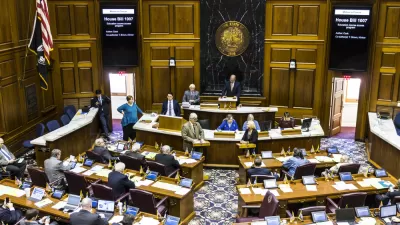Now that voters have decisively rejected a sales tax measure that would have also hiked the gas tax, House representatives have proposed eliminating the state's Earned Income Tax Credit that benefits the working poor to help pay for roads.
Michigan legislators are getting desperate to find funding to address the state's "terrible roads" after voters rejected Proposition 1 by a 80 percent to 20 percent margin last month. We knew they were planning to resort to using so-called surplus general funds for roads, but the extent of diversion is truly surprising and upsetting to some public policy experts.
"The Michigan House approved a plan to shift hundreds of millions of dollars from the state's general fund and make other changes aimed at putting nearly $1.2 billion a year toward repairing the state's roads," writes Brian McGillivary of the Traverse City Eagle-Record. "Lawmakers also found $117 million through the elimination of the state Earned Income Tax Credit."
"The Michigan Earned Income Tax Credit lets working families who earn low wages or who have fallen on hard times keep more of what they earn to afford the basics," according to the Michigan League for Public Policy.
Eliminating the EITC to pay for roads amounts to robbing Peter to pay Paul. The $117 million saved by eliminating the credit is a drop in the bucket of a $1 billion plus transportation plan, but a huge amount to families who need the credit to make ends meet.
Democrat Jon Hoadley of Kalamazoo described the elimination of the EITC as "filling potholes at the expense of the poor," reported CBS Detroit.
To be sure, the "House road package" [PDF] does include increases in user fees, though not the gasoline tax, reports McGillivary.
The plan would raise the diesel tax to 19 cents from 15 cents to match the gas tax and index both taxes to inflation. Registration fees would be raised by $30 on certain hybrid vehicles and by $100 on electric vehicles.
The largest amount of funds in the House road plan will come from the diversion of income tax funds according to the House fiscal agency memo [PDF]. Rather ironically, the plan also diverts tobacco settlement revenue so motorists can drive on better roads.
Doug Rothwell of Business Leaders for Michigan called for "a permanent, long-term solution to increase road repair funding without raiding the General Fund and hurting other critical priorities that are important to our economy," he told CBS. "The revenue should come from the users of our roads and bridges and be sufficient to ensure good quality road and bridge conditions."
FULL STORY: House diverts money toward roads

Maui's Vacation Rental Debate Turns Ugly
Verbal attacks, misinformation campaigns and fistfights plague a high-stakes debate to convert thousands of vacation rentals into long-term housing.

Planetizen Federal Action Tracker
A weekly monitor of how Trump’s orders and actions are impacting planners and planning in America.

In Urban Planning, AI Prompting Could be the New Design Thinking
Creativity has long been key to great urban design. What if we see AI as our new creative partner?

King County Supportive Housing Program Offers Hope for Unhoused Residents
The county is taking a ‘Housing First’ approach that prioritizes getting people into housing, then offering wraparound supportive services.

Researchers Use AI to Get Clearer Picture of US Housing
Analysts are using artificial intelligence to supercharge their research by allowing them to comb through data faster. Though these AI tools can be error prone, they save time and housing researchers are optimistic about the future.

Making Shared Micromobility More Inclusive
Cities and shared mobility system operators can do more to include people with disabilities in planning and operations, per a new report.
Urban Design for Planners 1: Software Tools
This six-course series explores essential urban design concepts using open source software and equips planners with the tools they need to participate fully in the urban design process.
Planning for Universal Design
Learn the tools for implementing Universal Design in planning regulations.
planning NEXT
Appalachian Highlands Housing Partners
Mpact (founded as Rail~Volution)
City of Camden Redevelopment Agency
City of Astoria
City of Portland
City of Laramie





























